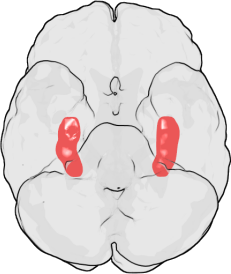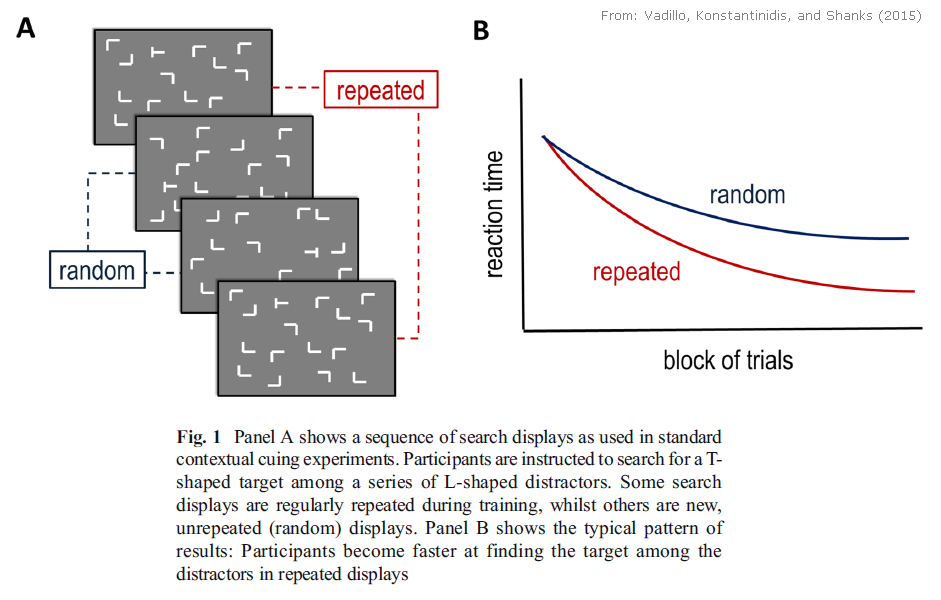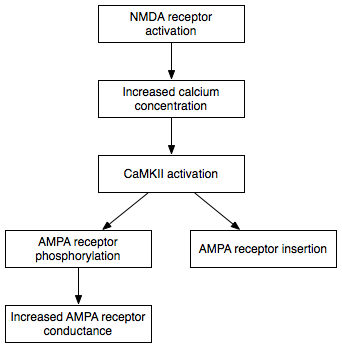|
Context-dependent Memory
In psychology, context-dependent memory is the improved recall of specific episodes or information when the context present at encoding and retrieval are the same. In a simpler manner, "when events are represented in memory, contextual information is stored along with memory targets; the context can therefore cue memories containing that contextual information". One particularly common example of context-dependence at work occurs when an individual has lost an item (e.g. lost car keys) in an unknown location. Typically, people try to systematically "retrace their steps" to determine all of the possible places where the item might be located. Based on the role that context plays in determining recall, it is not at all surprising that individuals often quite easily discover the lost item upon returning to the correct context. This concept is heavily related to the encoding specificity principle. This example best describes the concept of context-dependent forgetting. However, the ... [...More Info...] [...Related Items...] OR: [Wikipedia] [Google] [Baidu] |
Recall (memory)
Recall in memory refers to the mental process of retrieval of information from the past. Along with encoding and storage, it is one of the three core processes of memory. There are three main types of recall: free recall, cued recall and serial recall. Psychologists test these forms of recall as a way to study the memory processes of humansrecall. (2010). In Encyclopædia Britannica. Retrieved March 04, 2010, from Encyclopædia Britannica Online: http://www.britannica.com/EBchecked/topic/493353/recal/ref> and animals. Two main theories of the process of recall are the two-stage theory and the theory of Encoding specificity principle, encoding specificity. Theories Two-stage theory The ''two-stage theory'' states that the process of recall begins with a search and retrieval process, and then a decision or recognition process where the correct information is chosen from what has been retrieved. In this theory, recognition only involves the latter of these two stages, or processes ... [...More Info...] [...Related Items...] OR: [Wikipedia] [Google] [Baidu] |
Functional Magnetic Resonance Imaging
Functional magnetic resonance imaging or functional MRI (fMRI) measures brain activity by detecting changes associated with blood flow. This technique relies on the fact that cerebral blood flow and neuronal activation are coupled. When an area of the brain is in use, blood flow to that region also increases. The primary form of fMRI uses the blood-oxygen-level dependent (BOLD) contrast, discovered by Seiji Ogawa in 1990. This is a type of specialized brain and body scan used to map neural activity in the brain or spinal cord of humans or other animals by imaging the change in blood flow ( hemodynamic response) related to energy use by brain cells. Since the early 1990s, fMRI has come to dominate brain mapping research because it does not involve the use of injections, surgery, the ingestion of substances, or exposure to ionizing radiation. This measure is frequently corrupted by noise from various sources; hence, statistical procedures are used to extract the underlying sig ... [...More Info...] [...Related Items...] OR: [Wikipedia] [Google] [Baidu] |
Extinction (psychology)
Extinction is a behavioral phenomenon observed in both operantly conditioned and classically conditioned behavior, which manifests itself by fading of non-reinforced conditioned response over time. When operant behavior that has been previously reinforced no longer produces reinforcing consequences the behavior gradually stops occurring.Miltenberger, R. (2012). ''Behavior modification, principles and procedures''. (5th ed., pp. 87-99). Wadsworth Publishing Company. In classical conditioning, when a conditioned stimulus is presented alone, so that it no longer predicts the coming of the unconditioned stimulus, conditioned responding gradually stops. For example, after Pavlov's dog was conditioned to salivate at the sound of a metronome, it eventually stopped salivating to the metronome after the metronome had been sounded repeatedly but no food came. Many anxiety disorders such as post traumatic stress disorder are believed to reflect, at least in part, a failure to extinguish c ... [...More Info...] [...Related Items...] OR: [Wikipedia] [Google] [Baidu] |
Orchestra
An orchestra (; ) is a large instrumental ensemble typical of classical music, which combines instruments from different families. There are typically four main sections of instruments: * bowed string instruments, such as the violin, viola, cello, and double bass * woodwinds, such as the flute, oboe, clarinet, saxophone, and bassoon * Brass instruments, such as the horn, trumpet, trombone, cornet, and tuba * percussion instruments, such as the timpani, snare drum, bass drum, cymbals, triangle, tambourine, and mallet percussion instruments Other instruments such as the piano, harpsichord, and celesta may sometimes appear in a fifth keyboard section or may stand alone as soloist instruments, as may the concert harp and, for performances of some modern compositions, electronic instruments and guitars. A full-size Western orchestra may sometimes be called a or philharmonic orchestra (from Greek ''phil-'', "loving", and "harmony"). The actual number of musi ... [...More Info...] [...Related Items...] OR: [Wikipedia] [Google] [Baidu] |
Free Recall
Free recall is a common task in the psychological study of memory. In this task, participants study a list of items on each trial, and then are prompted to recall the items in any order. Items are usually presented one at a time for a short duration, and can be any of a number of nameable materials, although traditionally, words from a larger set are chosen. The recall period typically lasts a few minutes, and can involve spoken or written recall. The standard test involves the recall period starting immediately after the final list item; this can be referred to as immediate free recall (IFR) to distinguish it from delayed free recall (DFR). In delayed free recall, there is a short distraction period between the final list item and the start of the recall period. Both IFR and DFR have been used to test certain effects that appear during recall tests, such as the primacy effect and recency effect. Methodology used in measuring performance One of the basic measures of perfo ... [...More Info...] [...Related Items...] OR: [Wikipedia] [Google] [Baidu] |
Semantic
Semantics (from grc, σημαντικός ''sēmantikós'', "significant") is the study of reference, meaning, or truth. The term can be used to refer to subfields of several distinct disciplines, including philosophy, linguistics and computer science. History In English, the study of meaning in language has been known by many names that involve the Ancient Greek word (''sema'', "sign, mark, token"). In 1690, a Greek rendering of the term ''semiotics'', the interpretation of signs and symbols, finds an early allusion in John Locke's ''An Essay Concerning Human Understanding'': The third Branch may be called [''simeiotikí'', "semiotics"], or the Doctrine of Signs, the most usual whereof being words, it is aptly enough termed also , Logick. In 1831, the term is suggested for the third branch of division of knowledge akin to Locke; the "signs of our knowledge". In 1857, the term '' semasiology'' (borrowed from German ''Semasiologie'') is attested in Josiah W. Gibbs' ... [...More Info...] [...Related Items...] OR: [Wikipedia] [Google] [Baidu] |
Autobiographical
An autobiography, sometimes informally called an autobio, is a self-written account of one's own life. It is a form of biography. Definition The word "autobiography" was first used deprecatingly by William Taylor in 1797 in the English periodical ''The Monthly Review'', when he suggested the word as a hybrid, but condemned it as "pedantic". However, its next recorded use was in its present sense, by Robert Southey in 1809. Despite only being named early in the nineteenth century, first-person autobiographical writing originates in antiquity. Roy Pascal differentiates autobiography from the periodic self-reflective mode of journal or diary writing by noting that " utobiographyis a review of a life from a particular moment in time, while the diary, however reflective it may be, moves through a series of moments in time". Autobiography thus takes stock of the autobiographer's life from the moment of composition. While biographers generally rely on a wide variety of documents ... [...More Info...] [...Related Items...] OR: [Wikipedia] [Google] [Baidu] |
Sensory Cue
Sensory may refer to: Biology * Sensory ecology, how organisms obtain information about their environment * Sensory neuron, nerve cell responsible for transmitting information about external stimuli * Sensory perception, the process of acquiring and interpreting sensory information * Sensory receptor, a structure that recognizes external stimuli * Sensory system The sensory nervous system is a part of the nervous system responsible for processing sensory information. A sensory system consists of sensory neurons (including the sensory receptor cells), neural pathways, and parts of the brain involved ..., part of the nervous system of organisms Business and brands * Sensory, Inc., an American speech technology company Other uses * Sensory analysis, a consumer product-testing method * Sensory garden, a self-contained garden area that allows visitors to enjoy a wide variety of sensory experiences See also * Sensor * Sense (other) {{Disambiguatio ... [...More Info...] [...Related Items...] OR: [Wikipedia] [Google] [Baidu] |
Contextual Cueing Effect
In psychology, contextual cueing refers to a form of visual search facilitation which describe targets appearing in repeated configurations are detected more quickly. The contextual cueing effect is a learning phenomenon where repeated exposure to a specific arrangement of target and distractor items leads to progressively more efficient search.Chun, M. M., & Jiang, Y. (1998). Contextual cueing: Implicit learning and memory of visual context guides spatial attention. ''Cognitive Psychology'', 36, 28-71 Theoretical Background In a global context, massive amounts of sensory input are received on a daily basis that would require an unrealistic amount of cognitive resources for it all to be processed. The concept of contextual cueing is that the brain has developed sophisticated mechanisms that aid us to subconsciously encode invariant visual information for the purpose of saving cognitive resources. Contextual information thereby becomes relevant because it embodies these fundament ... [...More Info...] [...Related Items...] OR: [Wikipedia] [Google] [Baidu] |
Placebo
A placebo ( ) is a substance or treatment which is designed to have no therapeutic value. Common placebos include inert tablets (like sugar pills), inert injections (like Saline (medicine), saline), sham surgery, and other procedures. In general, placebos can affect how patients perceive their condition and encourage the body's chemical processes for relieving pain and a few other symptoms, but have no impact on the disease itself. Improvements that patients experience after being treated with a placebo can also be due to unrelated factors, such as regression to the mean (a statistical effect where an unusually high or low measurement is likely to be followed by a less extreme one). The use of placebos in clinical medicine raises ethical concerns, especially if they are disguised as an active treatment, as this introduces dishonesty into the doctor–patient relationship and bypasses informed consent. While it was once assumed that this deception was necessary for placebos to have ... [...More Info...] [...Related Items...] OR: [Wikipedia] [Google] [Baidu] |
Generalization
A generalization is a form of abstraction whereby common properties of specific instances are formulated as general concepts or claims. Generalizations posit the existence of a domain or set of elements, as well as one or more common characteristics shared by those elements (thus creating a conceptual model). As such, they are the essential basis of all valid deductive inferences (particularly in logic, mathematics and science), where the process of verification is necessary to determine whether a generalization holds true for any given situation. Generalization can also be used to refer to the process of identifying the parts of a whole, as belonging to the whole. The parts, which might be unrelated when left on their own, may be brought together as a group, hence belonging to the whole by establishing a common relation between them. However, the parts cannot be generalized into a whole—until a common relation is established among ''all'' parts. This does not mean that th ... [...More Info...] [...Related Items...] OR: [Wikipedia] [Google] [Baidu] |
Encoding (memory)
Memory has the ability to encode, store and recall information. Memories give an organism the capability to learn and adapt from previous experiences as well as build relationships. Encoding allows a perceived item of use or interest to be converted into a construct that can be stored within the brain and recalled later from long-term memory. Working memory stores information for immediate use or manipulation which is aided through hooking onto previously archived items already present in the long-term memory of an individual. History Encoding is still relatively new and unexplored but origins of encoding date back to age old philosophers such as Aristotle and Plato. A major figure in the history of encoding is Hermann Ebbinghaus (1850–1909). Ebbinghaus was a pioneer in the field of memory research. Using himself as a subject he studied how we learn and forget information by repeating a list of nonsense syllables to the rhythm of a metronome until they were committed to his ... [...More Info...] [...Related Items...] OR: [Wikipedia] [Google] [Baidu] |



.jpg)



